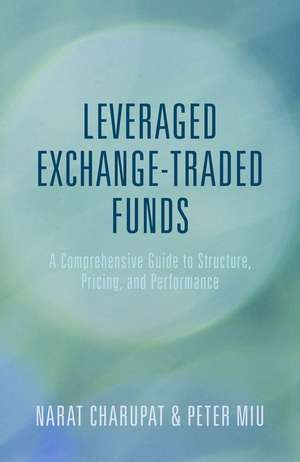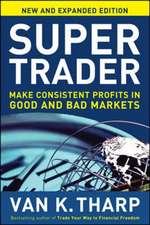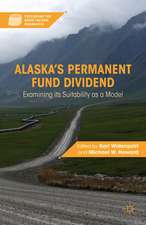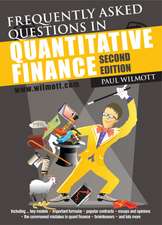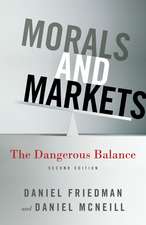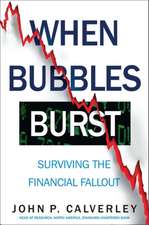Leveraged Exchange-Traded Funds: A Comprehensive Guide to Structure, Pricing, and Performance
Autor Peter Miu, Narat Charupaten Limba Engleză Hardback – 5 ian 2016
This comprehensive guide to LETFs provides high-level practitioners and researchers with a detailed reference tool for navigating the market and making informed investment decisions. Written from a measured analytical perspective, Miu and Charupat use clear and concise explanations of all important aspects of LETFs, focusingon such key elements as structure, pricing, performance, regulations, taxation, and trading strategies. The first two chapters set the stage for the book by identifying exactly what LETFs are and how they are regulated. The following chapters then look to bridge theory with practice to dive deep into the mechanics, portfolio rebalancing techniques, and daily compounding effects that make investing in these funds so lucrative.
Preț: 381.39 lei
Nou
Puncte Express: 572
Preț estimativ în valută:
72.98€ • 78.04$ • 60.85£
72.98€ • 78.04$ • 60.85£
Carte disponibilă
Livrare economică 28 martie-11 aprilie
Preluare comenzi: 021 569.72.76
Specificații
ISBN-13: 9781137478207
ISBN-10: 1137478209
Pagini: 192
Ilustrații: X, 176 p.
Dimensiuni: 155 x 235 x 22 mm
Greutate: 0.45 kg
Ediția:1st ed. 2016
Editura: Palgrave Macmillan US
Colecția Palgrave Macmillan
Locul publicării:New York, United States
ISBN-10: 1137478209
Pagini: 192
Ilustrații: X, 176 p.
Dimensiuni: 155 x 235 x 22 mm
Greutate: 0.45 kg
Ediția:1st ed. 2016
Editura: Palgrave Macmillan US
Colecția Palgrave Macmillan
Locul publicării:New York, United States
Cuprins
List of Figures
List of Tables
1.Introduction
2.Regulations and Taxations of Leveraged ETFs
3.Mechanics of Leveraged Exchange-Traded Funds
4.Return Dynamics and Compounding Effects
5.Pricing Efficiency
6.Performance and tracking errors of LETF
7.Trading Strategies
8.Options on LETFs
Bibliography
List of Tables
1.Introduction
2.Regulations and Taxations of Leveraged ETFs
3.Mechanics of Leveraged Exchange-Traded Funds
4.Return Dynamics and Compounding Effects
5.Pricing Efficiency
6.Performance and tracking errors of LETF
7.Trading Strategies
8.Options on LETFs
Bibliography
Recenzii
An essential resource for those wanting to understand the intricacies of Leveraged Exchange Traded Funds, Mssrs. Charupat and Miu offer an in-depth examination of the operations of, the mathematics behind, and the general utility of, LETFs. This book is a must-read for any industry professional who strives to comprehend exactly what makes LETFs function, and wants an excellent illustration of all of the nuances of this very effective investing tool. Highly recommended for investors, advisors, compliance professionals and regulators alike.' —Jaime Purvis, Executive Vice-President, Horizons ETFs
Notă biografică
Narat Charupat is Professor of Finance at the DeGroote School of Business, McMaster University, USA. Prior to joining academia, he worked as a financial analyst for an investment bank and risk management software company, where he conducted research into the areas of financial innovation, security designs, annuity and insurance products, arbitrage relationships, commodity investments, and behavioral finance. He is the co-author of a textbook on strategic financial planning and has published extensively in the Journal of Banking and Finance, Journal of Economic Theory, Journal of Financial and Quantitative Analysis, and Journal of Risk and Insurance.
Dr. Peter Miu is Professor of Finance at the DeGroote School of Business, McMaster University. His research is primarily in the areas of credit risk modeling, exchange-traded funds, and investments. He has served as a consultant for major financial institutions in North America, where he worked on such issues as validations of credit risk measures, regulatory capital requirements, risk rating and stress testing modeling. He is the co-author of two books on Basel II and III that provide both the theory and practical how-to knowledge risk management professionals need to implement the concepts of these regulatory requirements in their institutions. He has also published extensively in journals on issues related to leveraged exchange-traded funds. He sits on the editorial board of the Journal of Risk Model Validation and currently holds the Michael Lee-Chin & Family Professorship in Strategic Business Studies at the DeGroote School of Business.
Dr. Peter Miu is Professor of Finance at the DeGroote School of Business, McMaster University. His research is primarily in the areas of credit risk modeling, exchange-traded funds, and investments. He has served as a consultant for major financial institutions in North America, where he worked on such issues as validations of credit risk measures, regulatory capital requirements, risk rating and stress testing modeling. He is the co-author of two books on Basel II and III that provide both the theory and practical how-to knowledge risk management professionals need to implement the concepts of these regulatory requirements in their institutions. He has also published extensively in journals on issues related to leveraged exchange-traded funds. He sits on the editorial board of the Journal of Risk Model Validation and currently holds the Michael Lee-Chin & Family Professorship in Strategic Business Studies at the DeGroote School of Business.
Textul de pe ultima copertă
Leveraged Exchange-Traded Funds (LETFs) are publicly-traded funds that promise to provide daily returns that are in a multiple (positive or negative) of the returns on an index. To meet that promise, the funds use leverage, which is typically obtained through derivatives such as futures contracts, forward contracts, and total-return swaps. As of the end of 2012, there were over 250 LETFs in North America with total assets of approximately $32.24 billion. While the amount of assets held by these funds is still small, their popularity continues to grow as their trading volume is significantly larger and much more dynamic than traditional, non-leveraged ETFs.
This comprehensive guide to LETFs provides high-level practitioners and researchers with a detailed reference tool for navigating the market and making informed investment decisions. Written from a measured analytical perspective, Miu and Charupat use clear and concise explanations of all important aspects of LETFs, focusingon such key elements as structure, pricing, performance, regulations, taxation, and trading strategies. The first two chapters set the stage for the book by identifying exactly what LETFs are and how they are regulated. The following chapters then look to bridge theory with practice to dive deep into the mechanics, portfolio rebalancing techniques, and daily compounding effects that make investing in these funds so lucrative.
This comprehensive guide to LETFs provides high-level practitioners and researchers with a detailed reference tool for navigating the market and making informed investment decisions. Written from a measured analytical perspective, Miu and Charupat use clear and concise explanations of all important aspects of LETFs, focusingon such key elements as structure, pricing, performance, regulations, taxation, and trading strategies. The first two chapters set the stage for the book by identifying exactly what LETFs are and how they are regulated. The following chapters then look to bridge theory with practice to dive deep into the mechanics, portfolio rebalancing techniques, and daily compounding effects that make investing in these funds so lucrative.
Caracteristici
First comprehensive work on the topic to bridge academic theory with applied perspectives Written by experienced and successful academics with significant industry experience LETFs are a growing area of focus among the investor community, as their trading volume is much larger than that of traditional, nonleveraged ETFs. As a result, there is a clear need for investors to understand their characteristics, pricing, and performance
